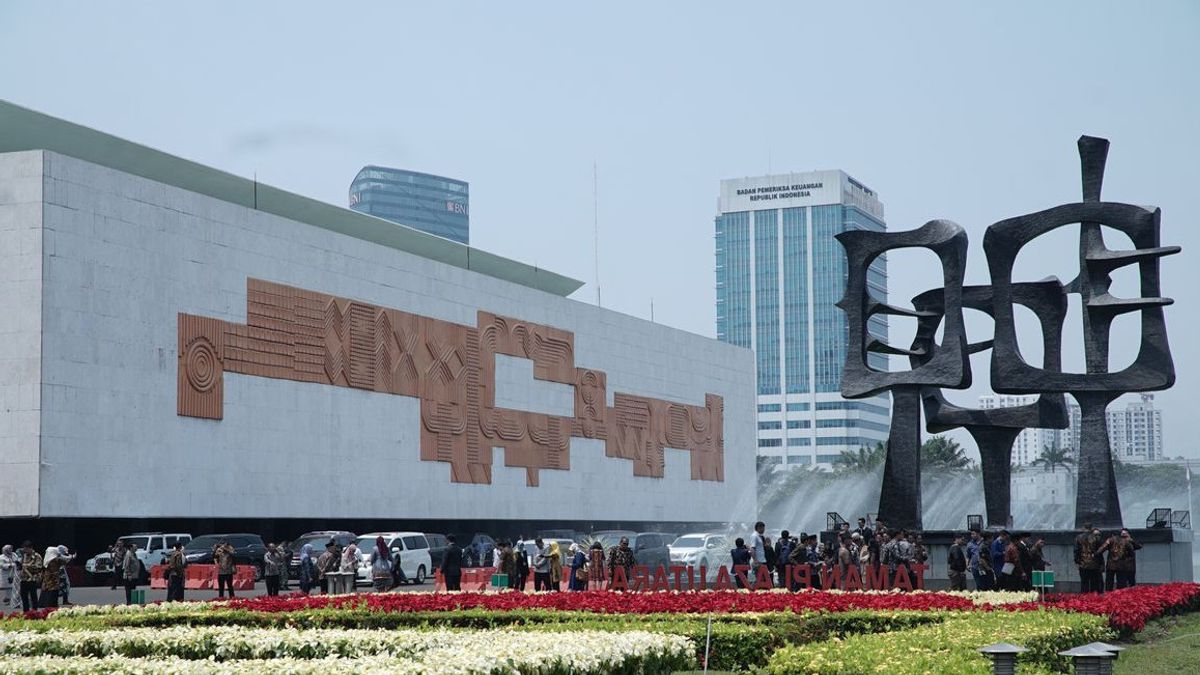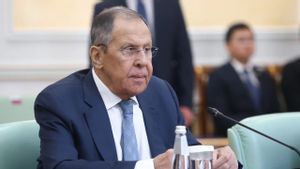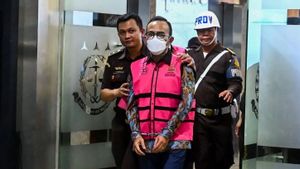JAKARTA - In the midst of the corona virus pandemic or COVID-19 where public concentration focuses on handling the outbreak, the government and the DPR are actually taking advantage of this situation. The Omnibus Law The Work Creation Bill (RUU), which has been challenged since its inception, continues the discussion.
Coordinator of the Mining Advocacy Network (JATAM) Merah Johansyah said the government and the DPR had never listened to public complaints about several fatal points contained in the Job Creation Bill.
Merah admitted, because of this, his party and several organizations, namely the Indonesian Legal Aid Foundation (YLBHI), the Consortium for Agrarian Reform (KPA), and the Confederation of Indonesian Workers' Unions (KPBI), took legal steps by suing the Omnibus Law on the Job Creation Bill to the DKI Jakarta State Administrative Court. on Thursday, April 30th.
"The President and the DPR are still determined to continue discussions for the ratification of this problematic bill. The plan to continue the discussion of the Omnibus Law violates several aspects," he said, during a virtual discussion with journalists, in Jakarta, Sunday, May 3.
Furthermore, Merah revealed, there were five reasons underlying his party to pursue legal channels and the belief that the Omnibus Law Bill had to be canceled. It's not enough to just issue an Employment cluster.
1. Defects of Procedure and Substance
This bill was drafted by ignoring procedures that are clearly regulated in Law no. 12 of 2011 concerning the Formation of Legislative Regulations. Starting from planning to formulating the president, it does not apply the principles of transparency, participation, and instead discriminates against the people by only involving groups of entrepreneurs.
"Since the beginning, the interest groups that should have been involved were not involved. The script was also not transparent, then there was no public involvement. The formation of the task force was also the majority of entrepreneurs. Most of the mining entrepreneurs, in our opinion, also have conflicting interests. Because they were once successful teams," he said.
The Initiative Code noted that 27 of the 54 Constitutional Court Decisions relating to the Law amended by the Cilaka Bill were not obeyed by the Government in drafting the substance of the Cilaka Bill, among others (a) Not following up on the Constitutional Interpretation of the Constitutional Court Decisions; (b) Only following up part of the interpretation of the Constitutional Court Decision; and (c) reviving articles that have been canceled by the Constitutional Court.
2. Ignoring the Impact of Environmental Damage
Then, continued Merah, the Omnibus Law also has an impact on environmental damage. Actually, the impact of environmental damage occurred before the Omnibus Law, but this was not an evaluation material and did not become an important note when formulating the bill.
"On the other hand, we see that if this continues, it will multiply environmental damage. Not evaluated, instead creating problematic new regulations, which will create more environmental damage," he said.
Merah revealed, if this bill is still allowed to continue, the impact will be damage to mainland Indonesia. This is because the land has been subject to exploitative permits. In the Omnibus Law mining cluster, the time limit is abolished. In the Minerba Law, he is related to changing 9 articles in the Minerba Law, removing 15 articles, and adding 6 new articles.
One of the changes, said Merah, is that the licensing period is not limited, so that until the mining runs out, mining activities are not integrated with processing or refining activities.
According to Merah, in the Omnibus Law, mineral and coal entrepreneurs have the privilege of having a power plant and smelter for minerals and metals. They are given additional articles, namely article 47 paragraph 6, 7, 8 and article 83.

"Providing privileges, will be given an unlimited period of licensing. As long as the mining material is in the ground, as long as it can also carry out mining," he said.
Based on JATAM's records, said Merah, currently 34 percent of the land area of the Indonesian archipelago has been plotted with mining permits. In addition, namely the amendment to Article 83 letter f. If the current Minerba Law is limited to a maximum of 100 thousand hectares for exploitation and 15 thousand hectares for exploration, in the Omnibus Law the mining concession area will know no boundaries. Of course the impact of the damage will be wider. Damage is not only on big islands, but also on the coast, sea and small islands.
"Unfortunately there is no involvement of small island communities, fishermen, coastal communities, or mine victims when conducting discussions. We predict that there will be enormous damage to the coast of the sea and small islands. This bill also uses a horse's point of view, does not want to look right and left. also with disaster-prone areas, "he said.
According to Merah, this bill does not care about disaster-prone areas, many geothermal mining operations are in earthquake, tsunami and flood areas. This will further make people's resilience vulnerable during this pandemic.
"It has been hit by an ISPA because of the coal-fired power plant, the mining area has increased again, is prone to disasters, is again threatened by hydrometrological disasters such as tsunamis, earthquakes and floods," he explained.
3. Entrepreneur ridden the Omnibus Law
This Job Creation Bill, said Merah, has degrading the dignity of the state, only serving the interests of entrepreneurs and ignoring the interests of the people. One of the examples, article 169 included in this bill, which wants to extend or agree to giant coal companies to produce about 60 percent of national coal.
"There are Kaltim Prima Coal (KPC), PT Adaro Energy Tbk (ADRO), PT Arutmin Indonesia, these giant companies will expire this year. Arutmin will expire at the end of this year. We see they are trying to support this Omnibus Law. "So that the Omnibus Law actually undermines the dignity of the country," he said.
According to Merah, this bill also violates the constitution, which places the state above business entities. That is, making megara below lower than business entities. One example is the article on the elimination of royalties, where mining companies are given the facility to no longer have to pay royalties to the state.
"There is no need to pay fees anymore if mining activities find metal or other materials when mining is carried out. So discounting, including the land acquisition regulation is given to the state or government. This puts the government at its level. Whereas in the current law, the matter of land acquisition is corporate and community affairs, "he said.
4. Regions Do not Have Authority
Merah said that this bill also made the centralization of authority redundant. Where all mining authorities, not only coal but also oil and gas, geothermal, and coal are all drawn to the central government, the regions do not have the authority.
"By (involving) the regional government is still at a distance from the people, especially if it is pulled by the central government. There is no evaluation in the academic text or a serious study about the delegation or centralization of this authority," he explained.
Then, Red continued, sanctions and environmental law enforcement are no longer independent. All of the civil service investigators (PPNS) related to mining supervision are coordinated with the police and all are drawn there.
5. Pro Gross Industry
Not only that, Merah revealed, the Omnibus Law is also very pro with the dirty energy industry. This is because there are many articles that provide fiscal and non-fiscal incentives for dirty energy, namely fossil energy and coal. Coal companies have benefited tremendously from this bill.
"The terminology of environmental permits has also been removed. Environmental permits no longer exist, which should be the business regime after environmental permits, now environmental permits are removed. AMDAL is only amputated for high-risk activities. Low, medium, and high risk categories are created. Whereas mining is all risky. high, how to divide it up, "he explained.
According to Merah, Article 25 of the AMDAL document is only of the directly affected communities that are relevant. So there is an attempt to narrow it down and do not want further popular participation. In fact, environmental damage flows its destructive power.
Then, he continued, legal violations against licensing are not subject to criminal sanctions, but administrative sanctions. Merah assessed that this was an effort to ride the law related to environmental enforcement was not optimal. Including the elimination of article 165 regarding mining permit corruption.
"Just replace it with a company, because it is no longer the Unitary State of the Republic of Indonesia, but a unitary state of Indonesian investors. Because there is no use for the Ministry of Environment, Ministry of Mining and others. Because only the interests of entrepreneurs are accommodated," he said.
The English, Chinese, Japanese, Arabic, and French versions are automatically generated by the AI. So there may still be inaccuracies in translating, please always see Indonesian as our main language. (system supported by DigitalSiber.id)













